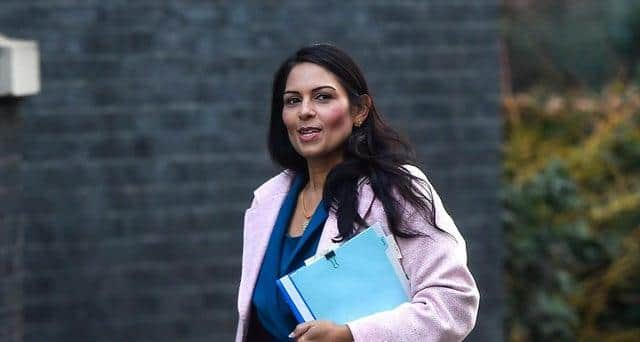What is gaslighting? Meaning of the term, and why Priti Patel has been accused of it amid Black Lives Matter debate


Home secretary Priti Patel has been accused by a group of Labour MPs of ‘gaslighting’, by using her own experiences of racism to silence the debate on the Black Lives Matter protests.
But what does gaslighting mean, and why is it being used in this context? Here’s what you need to know.
What is gaslighting?
Advertisement
Hide AdAdvertisement
Hide AdGaslighting is a term usually used to describe one person’s efforts to gain control by undermining another person’s sense of reality.
Most commonly gaslighting is used in the context of romantic relationships, however, increasingly it is used to describe any sort of manipulative behaviour in friendships, professional relationships and politics.
Psychology Today defines gaslighting as “An insidious form of manipulation and control”, whereby victims are “bombarded with false information that leads them to question what they know to be true, even about themselves.”
Stephan Lewandowsky, Chair of Cognitive Psychology, University of Bristol explains in an article in The Conversation, that “When it comes to politics, the signs are similar. You may feel confused and alone in the world, assuming nobody understands your point of view and that it must therefore be wrong.”
What are the origins of the term “gaslighting”?
The term comes from a 1938 play, Gas Light, and a film adaptation starring Ingrid Bergman.
It follows the story of a couple whose home is fuelled by gas lamps, which become dimmed when the husband searches the attic at night.
When his wife confronts him about where he is disappearing to, he convinces her that she is imagining the change.
Why was Priti Patel accused of gaslighting?
Priti Patel has been accused of undermining protesters’ concerns by using her own experiences of discrimination to silence the debate.
Advertisement
Hide AdAdvertisement
Hide AdDuring a statement on the recent anti-racism protests sparked by the death of African American man George Floyd in Minneapolis, Ms Patel said that most of them had been “peaceful”, but in response to the more violent events, she said "this hooliganism is utterly indefensible".
Black Labour MP Florence Eshalomi called for the home secretary to “act now” to resolve “structural inequality, discrimination and racism” amid UK protests, and voiced doubts as to whether Patel understands the “anger and frustration” felt by protesters.
Patel responded by telling MPs of how she’d suffered racism throughout her life.
She said: “Well, on that basis, it must have been a very different home secretary who as a child was frequently called a Paki in the playground, a very different home secretary who was racially abused in the streets or even advised to drop her surname and use her husband’s in order to advance her career.
“So, when it comes to racism, sexism, tolerance for social justice, I will not take lectures from the other side of the House.”
A group of more than 30 black and minority ethnic Labour MPs wrote to Ms Patel asking her to “reflect on her words”. It was sent with a letterhead from Labour MP Naz Shah and signed by former shadow home secretary Diane Abbott, Florence Eshalomi, Tan Dhesi and Rosena Allin-Khan among others.
It reads: "We write to you as black, Asian and ethnic minority Labour MPs to highlight our dismay at the way you used your heritage and experiences of racism to gaslight the very real racism faced by black people and communities across the UK.
"Our shared experiences allow us to feel the pain that communities feel, when they face racism, they allow us to show solidarity towards a common cause; they do not allow us to define, silence or impede on the feelings that other minority groups may face.
Advertisement
Hide AdAdvertisement
Hide Ad"Being a person of colour does not automatically make you an authority on all forms of racism.
"In conclusion, we ask you to reflect on your words and to consider the impact it had towards the black communities in the UK trying to highlight their voices against racism."
Ms Patel responded to the letter on Twitter, saying: “I will not be silenced by @UKLabour MPs who continue to dismiss the contributions of those who don’t conform to their view of how ethnic minorities should behave.”